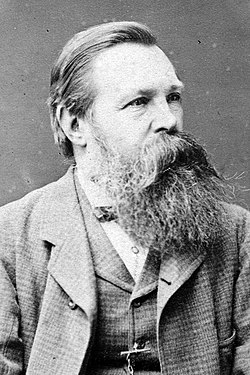Friedrich Engels Quote
The 'Manifesto' being our joint production, I consider myself bound to state that the fundamental proposition which forms its nucleus belongs to . That proposition is: that in every historical epoch, the prevailing mode of economic production and exchange, and the social organization necessarily following from it, form the basis upon which is built up, and from which alone can be explained, the political and intellectual history of that epoch; that consequently the whole history of mankind (since the dissolution of primitive tribal society, holding land in common ownership) has been a history of class struggles, contests between exploiting and exploited, ruling and oppressed classes; that the history of these class struggles forms a series of evolution in which, nowadays, a stage has been reached where the exploited and the oppressed class—the proletariat—cannot attain its emancipation from the sway of the exploiting and ruling class—the bourgeoisie—without, at the same time, and once for all, emancipating society at large from all exploitation, oppression, class distinctions and class struggles.This proposition, which, in my opinion, is destined to do for history what 's theory has done for biology, we, both of us, had been gradually approaching for some years before 1845.
The 'Manifesto' being our joint production, I consider myself bound to state that the fundamental proposition which forms its nucleus belongs to . That proposition is: that in every historical epoch, the prevailing mode of economic production and exchange, and the social organization necessarily following from it, form the basis upon which is built up, and from which alone can be explained, the political and intellectual history of that epoch; that consequently the whole history of mankind (since the dissolution of primitive tribal society, holding land in common ownership) has been a history of class struggles, contests between exploiting and exploited, ruling and oppressed classes; that the history of these class struggles forms a series of evolution in which, nowadays, a stage has been reached where the exploited and the oppressed class—the proletariat—cannot attain its emancipation from the sway of the exploiting and ruling class—the bourgeoisie—without, at the same time, and once for all, emancipating society at large from all exploitation, oppression, class distinctions and class struggles.This proposition, which, in my opinion, is destined to do for history what 's theory has done for biology, we, both of us, had been gradually approaching for some years before 1845.
Related Quotes
[:]Atheism by itself is, of course, not a moral position or a political one of any kind; it simply is the refusal to believe in a supernatural dimension. For you to say of Nazism that it was the imple...
Whilst on board the Beagle I was quite orthodox, and I remember being heartily laughed at by several of the officers... for quoting the Bible as an unanswerable authority on some point of morality......
[Religious belief is] outmoded and ridiculous. [Belief in gods was a] worn out but once useful crutch in mankind's journey towards truth. We consider the time has come for that crutch to be abandoned....
About Friedrich Engels
Born in Barmen in the Kingdom of Prussia, Engels was the son of a wealthy textile manufacturer. Despite his bourgeois background, he became a staunch critic of capitalism, influenced by his observations of industrial working conditions in Manchester, England, as published in his early work The Condition of the Working Class in England (1845). He met Marx in 1844, after which they jointly authored works including The Holy Family (1844), The German Ideology (written 1846), and The Communist Manifesto (1848), and worked as political activists in the Communist League and First International. Engels also supported Marx financially for much of his life, enabling him to continue his writing in London. After Marx's death in 1883, Engels edited from his manuscripts to complete Volumes II and III of his work Das Kapital (1885 and 1894).
Engels' own works, including Anti-Dühring (1878), Socialism: Utopian and Scientific (1880), Dialectics of Nature (written 1872–1882), The Origin of the Family, Private Property and the State (1884), and Ludwig Feuerbach and the End of Classical German Philosophy (1886), are foundational to Marxist theory.
